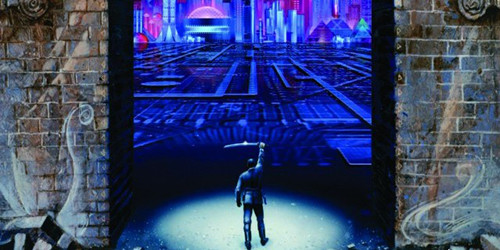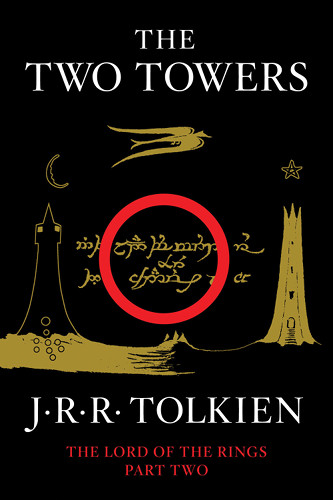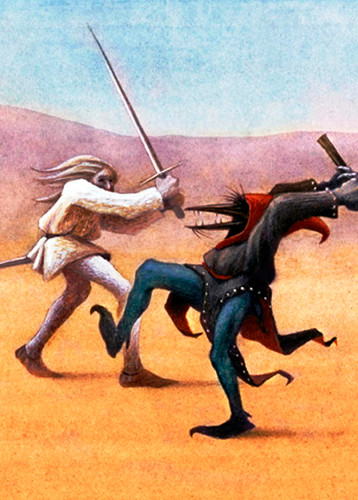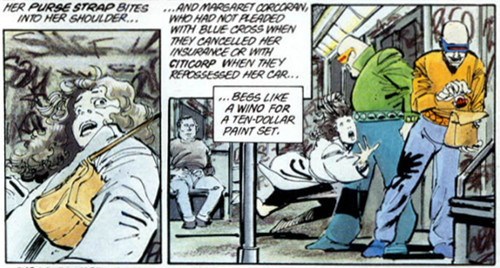Excerpt from the novel Snow Crash 
 by Neal Stephenson
by Neal Stephenson 


Y.T.’s mom works in Fedland. She has parked her little car in her own little numbered slot, for which the Feds require her to pay about ten percent of her salary (if she doesn’t like it she can take a taxi or walk) and walked up several levels of a blindingly lit reinforced-concrete helix in which most of the spaces—the good spaces closer to the surface—are reserved for people other than her, but empty. She always walks up the center of the ramp, between the rows of parked cars, so that the EBGOC (Executive Branch General Operational Command) boys won’t think she’s lurking, loitering, skulking, malingering, or smoking.
Reaching the subterranean entrance of her building, she has taken all metal objects from her pockets and removed what little jewelry she’s wearing and dumped them into a dirty plastic bowl and walked through the detector. Flashed her badge. Signed her name and noted down the digital time. Submitted to a frisking from an EBGOC girl. Annoying, but it sure beats a cavity search. They have a right to do a cavity search if they want. She got cavity-searched every day for a month once, right after she had spoken up at a meeting and suggested that her supervisor might be on the wrong track with a major programming project. It was punitive and vicious, she knew it was, but she always wanted to give something back to her country, and whenever you work for the Feds you just accept the fact that there’s going to be some politicking. And that as a low-level person you’re going to bear the brunt. And later on, you climb the GS ladder, don’t have to put up with as much shit. Far be it from her to quarrel with her supervisor. Her supervisor, Marietta, doesn’t have an especially stellar GS level, but she does have access. She has connections. Marietta knows people who know people. Marietta has attended cocktail parties that were also attended by some people who, well, your eyes would bug out.
She has passed the frisking with flying collars. Put the metal stuff back into her pockets. Climbed up half a dozen flights of stairs to her floor. The elevators here still work, but some very highly placed people in Fedland have let it be known—nothing official, but they have ways of letting this stuff out—that it is a duty to conserve energy. And the Feds are real serious about duty. Duty, loyalty, responsibility. The collagen that binds us to into the United States of America. So the stairwells are filled with sweaty wool and clacking leather. If you took the elevator, no one would actually say anything, but it would be noticed. Noticed and written down and taken into account. People would look at you, glance you up and down, like, what happened, sprain your ankle? Taking the stairs is no problem.
Feds don’t smoke. Feds generally don’t overeat. The health plan is very specific, contains major incentives, get too heavy or wheezy and, no one says anything about it—which would be rude—but you feel a definite pressure, a sense of not fitting in, as you walk across the sea of desks, eyes glance up to follow you, estimating the mass of your saddlebags, eyes darting back and forth between desks as, by consensus, your co-workers say to themselves, I wonder how much he or she is driving up our health plan premiums?
So Y.T.’s mom has clacked up the stairs in her black pumps and gone into her office, actually a large room with computer workstations placed across it in a grid. Used to be divided up by partitions, but the EBGOC boys didn’t like it, said what would happen if there had to be an evacuation? All those partitions would impede the free flow of unhinged panic. So no more partitions. Just workstations and chairs. Not even any desktops. Desktops encourage the use of paper, which is archaic and reflects inadequate team spirit. What is so special about your work that you have to write it down on a piece of paper that only you get to see? That you have to lock it away inside a desk? When you’re working for the Feds, everything you do is the property of the United States of America. You do your work on the computer. The computer keeps a copy of everything, so that if you get sick or something, it’s all there where your co-workers and supervisors can get access to it. If you want to write little notes or make phone doodles, you’re perfectly free to do that at home, in your spare time.
And there’s the question of interchangeability. Fed workers, like military people, are intended to be interchangeable parts. What happens if your workstation should break down? You’re going to sit there and twiddle your thumbs until it gets fixed? No siree, you’re going to move a spare workstation and get to work on that. And you don’t have that flexibility if you’ve got half a ton of personal stuff cached inside of a desk, strewn around a desktop.
So there is no paper in a Fed office. All the workstations are the same. You come in in the morning, pick one at random, sit down, and get to work. You could try to favor a particular station, try to sit there every day, but it would be noticed. Generally you pick the unoccupied workstation that’s closest to the door. That way, whoever came in the earliest sits closest, whoever came in latest is way in the back, for the rest of the day it’s obvious at a glance who’s on the ball in this office and who is—as they whisper to each other in the bathrooms—having problems.
Not that it’s any big secret, who comes in first. When you sign on to a workstation in the morning, it’s not like the central computer doesn’t notice that fact. The central computer notices just about everything. Keeps track of every key you hit on the keyboard, all day long, what time you hit it, down to the microsecond, whether it was the right key or the wrong key, how many mistakes you make and when you make them. You’re only required to be at your workstation from eight to five, with a half-hour lunch break and two ten-minute coffee breaks, but if you stuck to that schedule it would definitely be noticed, which is why Y.T.’s mom is sliding into the first unoccupied workstation and signing on to her machine at quarter to seven. Half a dozen other people are already here, signed on to workstations closer to the entrance, but this isn’t bad. She can look forward to a reasonably stable career if she can keep up this sort of performance.
The Feds still operate in Flatland. None of this three-dimensional stuff, no goggles, no stereo sound. The computers are all basic flat-screen two-dimensional numbers. Windows appear on the desktop, with little text documents inside. All part of the austerity program. Soon to reap major benefits.
She signs on and checks her mail. No personal mail, just a couple of mass-distributed pronouncements from Marietta.
NEW TP POOL REGULATIONS
I’ve been asked to distribute the new regulations regarding office pool displays. The enclosed memo is a new subchapter of the EBGOC Procedure Manual, replacing the old subchapter entitled PHYSICAL PLANT/CALIFORNIA/LOS ANGELES/BUILDINGS/OFFICE AREAS/PHYSICAL LAYOUT REGULATIONS/EMPLOYEE INPUT/GROUP ACTIVITIES.
The old subchapter was a flat prohibition on the use of office space or time for “pool” activities of any kind, whether permanent (e.g., coffee pool) or one-time (e.g., birthday parties).
This prohibition still applies, but a single, one-time exception has now been made for any office that wishes to pursue a joint bathroom-tissue strategy.
By way of introduction, let me just make a few general comments on this subject. The problem of distributing bathroom tissue to workers presents inherent challenges for any office management system due to the inherent unpredictability of usage—not every facility usage transaction necessitates the use of bathroom tissue, and when it is used, the amount needed (number of squares) may vary quite widely from person to person and, for a given person, from one transaction to the next. This does not even take into account the occasional use of bathroom tissue for unpredictable/creative purposes such as applying/removing cosmetics, beverage-spill management, etc. For this reason, rather than trying to package bathroom tissue in small one-transaction packets (as is done with pre-moistened towelettes, for example), which can be wasteful in some cases and limiting in other cases, it has been traditional to package this product in bulk distribution units whose size exceeds the maximum amount of squares that an individual could conceivably use in a single transaction (barring force majeure). This reduces to a minimum the number of transactions in which the distribution unit is depleted (the roll runs out) during the transaction, a situation that can lead to emotional stress for the affected employee. However, it does present the manager with some challenges in that the distribution unit is rather bulky and must be repeatedly used by a number of different individuals if it is not to be wasted.
Since the implementation of Phase XVII of the Austerity Program, employees have been allowed to bring their own bathroom tissue from home. This approach is somewhat bulky and redundant, as every worker usually brings their own roll.
Some offices have attempted to meet this challenge by instituting bathroom-tissue pools.
Without overgeneralizing, it may be stated that an inherent and irreducible feature of any bathroom-tissue pool implemented at the office level, in an environment (i.e., building) in which comfort stations are distributed on a per-floor basis (i.e., in which several offices share a single facility) is that provision must be made within the confines of the individual office for temporary stationing of bathroom tissue distribution units (i.e., rolls). This follows from the fact that if the BTDUs (rolls) are stationed, while inactive, outside of the purview of the controlling office (i.e., the office that has collectively purchased the BTDU)—that is, if the BTDUs are stored, for example, in a lobby area or within the facility in which they are actually utilized, they will be subject to pilferage and “shrinkage” as unathorized persons consume them, either as part of a conscious effort to pilfer or out of an honest misunderstanding, i.e., a belief that the BTDUs are being provided free of charge by the operating agency (in this case the United States Government), or as the result of necessity, as in the case of a beverage spill that is encroaching on sensitive electronic equipment and whose management will thus brook no delay. This fact has led certain offices (which shall go unnamed—you know who you are, guys) to establish makeshift BTDU depots that also serve as pool-contribution collection points. Usually, these depots take the form of a table, near the door closest to the facility, on which the BTDUs are stacked or otherwise deployed, with a bowl or some other receptacle in which participants may place their contributions, and typically with a sign or other attention-getting device (such as a stuffed animal or cartoon) requesting donations. A quick glance at the current regulations will show that placement of such a display/depot violates the procedure manual. However, in the interests of employee hygiene, morale, and group spirit-building, my higher-ups have agreed to make a one-time exception in the regulations for this purpose.
As with any part of the procedure manual, new or old, it is your responsibility to be thoroughly familiar with this material. Estimated reading time for this document is 15.62 minutes (and don’t think we won’t check). Please make note of the major points made in this document, as follows:
1) BTDU depot/displays are now allowed, on a trial basis, with the new policy to be reviewed in six months.
2) These must be operated on a voluntary, pool-type basis, as described in the subchapter on employee pools. (Note: This means keeping books and tallying all financial transactions.)
3) BTDUs must be brought in by the employees (not shipped through the mailroom) and are subject to all the usual search-and-seizure regulations.
4) Scented BTDUs are prohibited as they may cause allergic reactions, wheezing, etc. in some persons.
5) Cash pool donations, as with all monetary transactions within the U.S. Government, must use official U.S. currency—no yen or Kongbucks!
Naturally, this will lead to a bulk problem if people try to use the donation bucket as a dumping ground for bundles of old billion- and trillion-dollar bills. The Buildings and Grounds people are worried about waste-disposal problems and the potential fire hazard that may ensue if large piles of billions and trillions begin to mount up. Therefore, a key feature of the new regulation is that the donation bucket must be emptied every day—more often if an excessive build-up situation is seen to develop.
In this vein, the B & G people would also like me to point out that many of you who have excess U.S. currency to get rid of have been trying to kill two birds with one stone by using old billions as bathroom tissue. While creative, this approach has two drawbacks:
1) It clogs the plumbing, and
2) It constitutes defacement of U.S. currency, which is a federal crime.
DON’T DO IT.
Join your office bathroom-tissue pool instead.
It’s easy, it’s hygienic, and it’s legal.
Happy pooling!
Marietta.
Y.T.’s mom pulls up the new memo, checks the time, and starts reading it. The estimated reading time is 15.62 minutes. Later, when Marietta does her end-of-day statistical roundup, sitting in her private office at 9:00 P.M., she will see the name of each employee and next to it, the amount of time spent reading this memo, and her reaction, based on the time spent, will go something like this:
Less than 10 min. Time for an employee conference and
possible attitude counseling.
10-14 min. Keep an eye on this employee; may be
developing a slipshod attitude.
14-15.61 min. Employee is an efficient worker, may
sometimes miss important details.
Exactly 15.62 min. Smartass. Needs attitude counseling.
15.63-16 min. Asswipe. Not to be trusted.
16-18 min. Employee is a methodical worker, may
sometimes get hung up on minor details.
More than 18 min. Check the security video-tape, see just
what this employee was up to (e.g.,
possible unauthorized restroom break).
Y.T.’s mom decides to spend between fourteen and fifteen minutes reading the memo. It’s better for younger workers to spend too long, to show that they’re careful, not cocky. It’s better for older workers to go a little fast, to show good management potential. She’s pushing forty. She scans through the memo, hitting the Page Down button at reasonably regular intervals, occasionally paging back up to pretend to reread some earlier section. The computer is going to notice all this. It approves of rereading. It’s a small thing, but over a decade or so of this stuff really shows up on your work-habits summary.
Having got that out of the way, she dives into work. She is an applications programmer for the Feds. In the old days, she would have written computer programs for a living. Nowadays, she writes fragments of computer programs. These programs are designed by Marietta and Marietta’s superiors in massive week-long meetings on the top floor. Once they get the design down, they start breaking up the problem into tinier and tinier segments, assigning them to group managers, who break them down even more and feed little bits of work to the individual programmers. In order to keep the work done by the individual coders from colliding, it all has to be done according to a set of rules and regulations even bigger and more fluid than the Government procedure manual.
So the first thing that Y.T.’s mother does, having read the new subchapter on bathroom tissue pools, is to sign on to a subsystem of the main computer system that handles the particular programming project she’s working on. She doesn’t know what the project is—that’s classified—or what it’s called. It’s just her project. She shares it with a few hundred other programmers, she’s not sure exactly who. And every day when she signs on to it, there’s a stack of memos waiting for her, containing new regulations and changes to the rules that they all have to follow when writing code for the project. These regulations make the business with the bathroom tissue seem as simple and elegant as the Ten Commandments.
So she spends until about eleven A.M. reading, rereading, and understanding the new changes in the Project. There are many of these, because this is a Monday morning and Marietta and her higher-ups spent the whole weekend closeted on the top floor, having a catfight about this Project, changing everything.
Then she starts going back over all the code she has previously written for the Project and making a list of all the stuff that will have to be rewritten in order to make it compatible with the new specifications. Basically, she’s going to have to rewrite all of her material from the ground up. For the third time in as many months.
But hey, it’s a job.
About eleven-thirty, she looks up, startled, to see that half a dozen people are standing around herworkstation. There’s Marietta. And a proctor. And some male Feds. And Leon the polygraph man.
“I just had mine on Thursday,” she says.
“Time for another one,” Marietta says. “Come on, let’s get this show on the road.”
“Hands out where I can see them,” the proctor says.
Like this:
Like Loading...
![]()
![]() by J.R.R. Tolkien
by J.R.R. Tolkien ![]()
![]()





